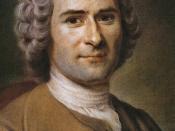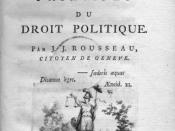With reference to The Social Contract and one painting by David, discuss the way in which Rousseau and David explore the notion of duty to the state.
In the 1700s, when France felt the oppression of the privileged, Jean Jacques Rousseau's The Social Contract and Jacques-Louis David's The Oath of Horatii fed their reasons, touched their senses and helped fanned the flames of the French Revolution. They gave the French the concept of duty to the state that made major changes to their society.
Rousseau explores the notion of duty to the state by addressing the fundamental problem of who the legitimate ruler should be. The opening statement of The Social Contract says "Man was free ..." (Block 3, p. 96). If men were free, then men were equal and should have equal rights to rule. But that does not ring true in a society when one lives under the authority of the state, for they cannot both be free and subjected to the law of the state (Block 3, p.
98).
Rousseau explains that the solution can be found if what the state wants is what the people want. He introduces the particular will (the goal and desires of the individual) and the general will (the goals and desires of the group) to resolve the issue. (Block 3, p. 103-104). He believes that there can only be one correct answer when everyone uses his rational and think with a clear head (Block 3, p. 122). He explains that when one gives in to his particular will, "the voice of duty replaces physical impulse and right replaces appetite..." and transforms him into "a stupid, limited animal" (Block 3, p. 109). Conversely, when one uses reason and foregoes his particular will, "[h]is faculties are exercised and developed, his ideas are...



Good.
Thank u for writing..I think he tried his best in trying to detail the discussion..may be he over did in some places where the reader gets a little bit confused..but overall it was good and gave a good idea about the subject..keep it up and thank u.
0 out of 0 people found this comment useful.